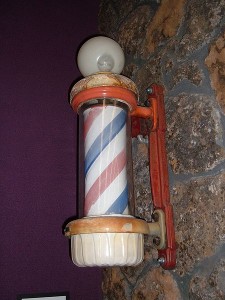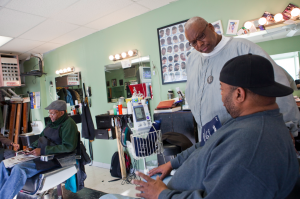
By Tom Peterson
“Alone we can do so little; together we can do so much,” said Helen Keller. It’s a repeated theme in this blog: The right social change partners can move a cause far beyond where it could have otherwise gone. For example, residents at an Oklahoma retirement center joined with the elementary school across the street to help children learn to read. Other seniors spend time talking online with Brazilians who want to learn English.
Hair Dressers & Skin Cancer
Some time ago I wrote about a move in the United Kingdom to train hairdressers to help reduce skin cancer. A BBC News article notes that while 100,000 new cases of skin cancer occur in the U.K. a year, there is no significant screening process. But training hairdressers from the country’s 36,000 salons in simple identification techniques could be a game changer in saving lives.
“Hairdressers would not be expected to make the diagnosis, but instead to tactfully point out any lumps, bumps or sores they find to their client who can bring it to the attention of their own doctor,” says the article. The concept has also been tested in Houston.
Barbers & High Blood Pressure
 Now, Les Gura, writing for stakeholderhealth.org tells of barbers in Washington, D.C., who offer blood pressure checks and diabetes screening along with a haircut. Perhaps, not so radical an idea since, as Gura points out, historically “barbers performed surgery, primitive as it might have been.”
Now, Les Gura, writing for stakeholderhealth.org tells of barbers in Washington, D.C., who offer blood pressure checks and diabetes screening along with a haircut. Perhaps, not so radical an idea since, as Gura points out, historically “barbers performed surgery, primitive as it might have been.”
The program was born at health system MedStar, whose Christopher King, worked with Duane Johnson (pictured checking a customer’s blood pressure) and other barbers.
There are now four barbershops participating in Washington D.C. neighborhoods. At M&S, Johnson and three barbers were trained to conduct the screenings themselves; the other shops use patient navigators brought on by MedStar to perform the screenings. But the decision to be screened arises through what King says is the most important part of the program—the age-old tradition of barbers and their patrons chewing the fat.
“Barbers have conversations with patrons about health and well-being. It goes beyond screening,’’ King says. “They’re having conversations about health, about mental health and about connecting to services in the community. And through peer-to-peer interactions, information is disseminated by a trusted source.”
And the program is showing early signs of making a real difference.
“We’ve actually physically saved two or three lives with this program,’’ Johnson says, a touch of pride in his voice. “These guys came in and their readings were so high we immediately called an ambulance and they were transported to the hospital.’’ Doctors, he says, later told him that if the men hadn’t been taken in that soon, there was no telling what might have happened.
Although those were unusual cases, Johnson happily points to the many shop regulars who now get their pressure taken, with all of the data duly recorded according to federal privacy laws and shared with any of the patrons’ providers as requested.
“We make a big to-do about that program. We take so much pride in helping that we requested literature to give to people and it was provided to us,’’ he says. “We sold it as a new barbershop product, ‘We’ve got to take your blood pressure.’ A lot of people didn’t take it seriously at first, but as they see the constant awareness and information here, they’ve taken us a lot more seriously. We just went and ran with it.”
Neighborhood Watch & the Elderly
Also from across the pond comes this pairing idea: The Guardian reports of health minister Norman Lamb advocating partnering the 4 million elderly with the 170,000 neighborhood watch groups in England in Wales.
The plan, which aims to reduce the number of old people being admitted to nursing homes, has the backing of senior government figures and has been welcomed by Neighbourhood Watch groups.
“The truth is that many people in this day and age live miserable lives,” Lamb said.
“We have a national movement that looks out for whether our houses are being burgled, so should we not be thinking—all of us stepping up to the plate—about whether there are people on our streets who have care needs, or who might just be very lonely and could do with a bit of companionship?”
FaithHealthNC is hoping to test this idea Winston-Salem, North Carolina, over the coming months.
Photo: Barber Pole, Broken Sphere, Creative Commons

No comments yet.